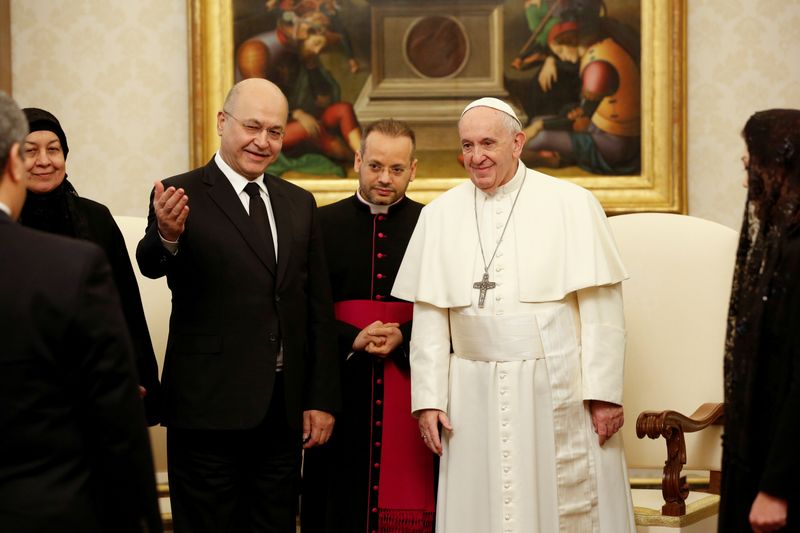By Philip Pullella
VATICAN CITY (Reuters) - Rockets have hit Iraqi cities and COVID-19 has flared,yet, barring last-minute changes, Pope Francis will embark on a whirlwind four-day trip starting on Friday to show solidarity with the country's devastated Christian community.
Keen to get on the road again after the pandemic put paid to several planned trips, he convinced some perplexed Vatican aides that it is worth the risk and that, in any case, his mind was made up, three Vatican sources said.
"He is itching to get back out on the road after such a long period," said one Vatican official. "Despite some misgivings, the general mood in here is that all systems are go."
The March 5-8 trip will be Francis' first outside Italy since November 2019, when he visited Thailand and Japan. Four trips planned for 2020 were cancelled because of COVID-19.
"He really feels that need to reach out to people on their home ground," said the official, a Vatican prelate who is familiar with Iraq and who spoke on condition of anonymity.
Vatican officials and local Church leaders say they are satisfied that Iraqi forces will be able to provide adequate security for the pope and his entourage.
"The pope knows where he is going. He is deliberately coming to an area marked by war and violence to bring a message of peace," Archbishop Bashar Warda of Erbil told reporters on a recent conference call.
"The authorities are taking the pope's security very seriously, with 10,000 security personnel deployed for the purpose," he said.
TRIP ELUDED OTHER POPES
Conflict in Iraq, birthplace of the Prophet Abraham - who is revered by Christians, Muslims and Jews - made a trip by Francis' predecessors elusive.
But while wars have ended, violence continues.
A twin suicide attack in Baghdad killed at least 32 people in January. The pope condemned the bombings.
Last Monday, rockets hit Baghdad's fortified Green Zone, which hosts government buildings and foreign embassies. There were no casualties.
Another shadow hanging over the trip is the coronavirus pandemic, which, along with security measures, will drastically limit the number of people who will see the pope in person.
Officials banned most travel within provinces after more than 4,000 new cases were detected on Thursday, for a total of more than 600,000 cases so far.
Francis, 84, has said it is important to make the trip even if most Iraqi Christians will see him only on television.
"They will see the pope is there in their country," he told Catholic News Service last month, adding: "I am the pastor of people who are suffering,"
Several Vatican and Iraqi Church officials say they are doing everything possible to ensure that papal appearances do not turn out to be super-spreader events.
The pope and his entourage, including the accompanying press corps, have been vaccinated. But most people who will attend papal events have not. A first batch of 50,000 doses is due to arrive in Iraq from China on Monday.
SOCIALLY DISTANCED GATHERINGS
Two gatherings at churches in Baghdad will be limited to about 100 people each, with social distancing and masks required.
Up to 10,000 people will have numbered seats for a papal Mass in a stadium in Erbil that has a capacity of 30,000, and contact tracing will be possible if there is an outbreak, Warda said.
Vatican and Iraqi planners of the trip got a sobering reminder of the spread of coronavirus in Iraq on Saturday when Archbishop Mitja Leskovar, the Vatican's ambassador there, said he had tested positive and had gone into self-isolation.
Leskovar has been the key planner of the trip and he had been due to be at the pope's side throughout the visit.
"This is not going to influence the pope’s program, which is going on as planned," Leskovar told Reuters.

For security reasons and so as not to draw crowds, the pope will use a closed car and not a popemobile on the streets, a Vatican source said.